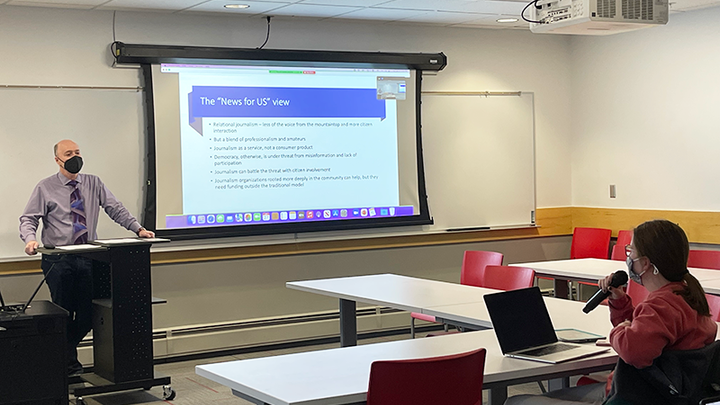A new course in the College of Journalism and Mass Communications is partnering with national and local news organizations to explore alternative business models in journalism.
In 2020-2021, the College of Journalism and Mass Communications undertook a comprehensive strategic planning process to lay the groundwork for college initiatives over the next five to 10 years. One of the central aims that emerged from that process was to help the industries served by the college - journalism, broadcasting, advertising and public relations and sports media and communication - solve critical challenges.
“Media and mass communications are rapidly evolving industries,” said Shari Veil, dean of the College of Journalism and Mass Communications. “With rapid change comes the need for rapid adaptation. The college has the opportunity to play a critical role in supporting our industries in Nebraska to adapt to the changing environment.”
Journalism, and more specifically news, has been hard hit by changes to the media and communication landscape. Traditionally, news organizations have relied on advertising revenue and subscription fees to support their operations. However, the emergence of digital media has dried up some traditional revenue streams. According to the Pew Research Center’s 2020 State of the News Media, national newspaper advertising revenue has fallen from a historic high of $49.4 billion in 2005 to just $8.8 billion in 2020, while subscription revenue has remained nearly flat.
The loss of revenue has led to the closure of newsrooms across the country, and Nebraska is no exception. According to “The Expanding News Desert,” a project by the University of North Carolina Hussman School of Journalism, only 14 of Nebraska’s 92 counties have a daily newspaper and newspaper circulation across Nebraska dropped 31% between 2004 and 2019. Nebraska now has seven counties with no newspaper and many have only one paper.
A new course in the college is bringing together students and journalism thought leaders to explore alternative business models to support the future of journalism. Joe Weber, Jerry and Karla Huse Professor of News-Editorial, is leading the course. Weber has engaged both Nebraska and national organizations to join the conversation.
“Folks joining us from Nebraska, such as those from the Flatwater Free Press, the Nebraska Examiner, Nebraska Public Media and NOISE Omaha, are exciting because they are bringing the novel approaches home to our state,” Weber said. “From outside, we have people from The Texas Tribune, The Colorado Sun, ProPublica and others, who will join us.”
Current industry innovators will discuss how their organizations are adapting to the decline in traditional revenues. The list of thought leaders participating in the course includes:
- Matt Wynn & Matt Hansen, Flatwater Free Press
- Allen Vaughan, Daily Nebraskan
- Nancy Finken, Nebraska Public Media
- Kelly Ann Scott, Alabama Media Group
- Andrea Verykoukis, States Newsroom (The Nebraska Examiner)
- Sara Lomax-Reese, WURD and URL Media Network
- Fraser Nelson, National Trust for Local News
- Alec Saelens, Solutions Journalism
- Tim Roesler, formerly of Minnesota Public Radio
- Peter Coy & Brian Zittel, New York Times
- Russ Baker, WhoWhatWhy
- Jacob Simas, Oaklandside
- Sewell Chan, The Texas Tribune
- Jim Simon, University of Washington
- Larry Ryckman, The Colorado Sun
- Celeste LeCompte, Chicago Public Media, formerly of ProPublica
- Jeff Jarvis, Tow-Knight Center for Entrepreneurial Journalism
- Eve Daniel Pearlman, Spaceship Media
- Myles Davis & Ashley Salem, NOISE
Weber hopes participation in the course will lead students to work for alternative news outlets or start their own after graduation. “Our students may wind up working for the emerging news outlets, as opposed to traditional newspapers and radio and TV stations that depend on threatened revenue streams, such as advertising. Learning what approaches are being taken out there, in what is an exploding area for news delivery, will help them make better career choices,” Weber said. “Some of the students may also go on to invent novel sites, so getting a sense of the great experimentation underway is vital.”
The conversation won’t be limited to the classroom. Weber is partnering with the College of Journalism and Mass Communications’ Seline Lecture Series to bring three of the speakers to a broader Nebraska audience. “Our hope is that through these conversations, current Nebraska journalism organizations can gain ideas and insights to support news organizations,” Veil said.
Moderated conversations with Sewell Chan, editor of The Texas Tribune, Larry Ryckman founder and editor of The Colorado Sun, and Celeste LeCompte, chief audience officer of Chicago Public Media, will be held on April 5, 14 and 21, respectively. The talks will be open to the public, streamed online and aired on LNKTV.
“A robust press is vital to the future of our state and country,” Veil said. “The college is excited to be engaging students, news organizations and Nebraskans in a dialogue about the future of journalism.”




